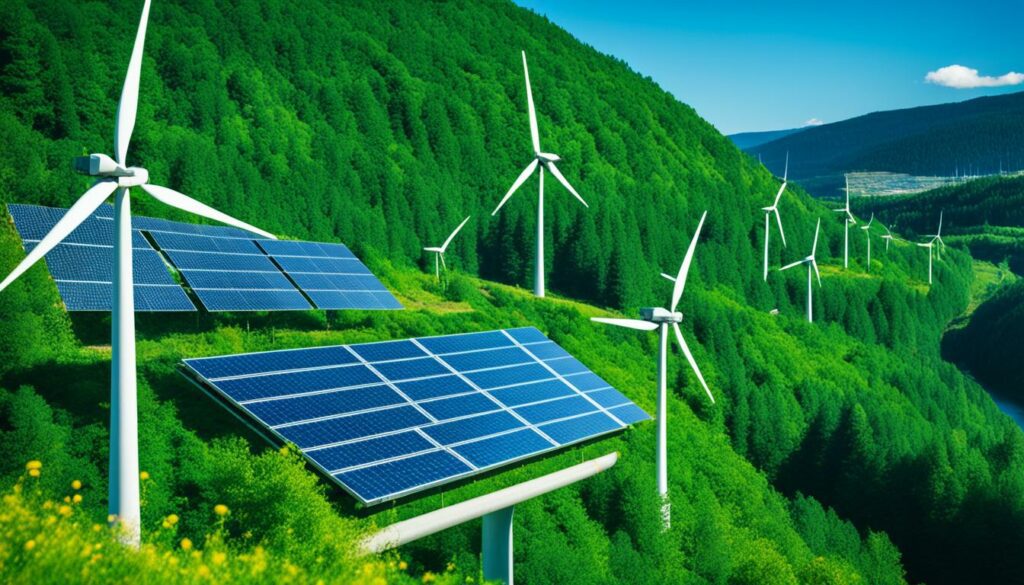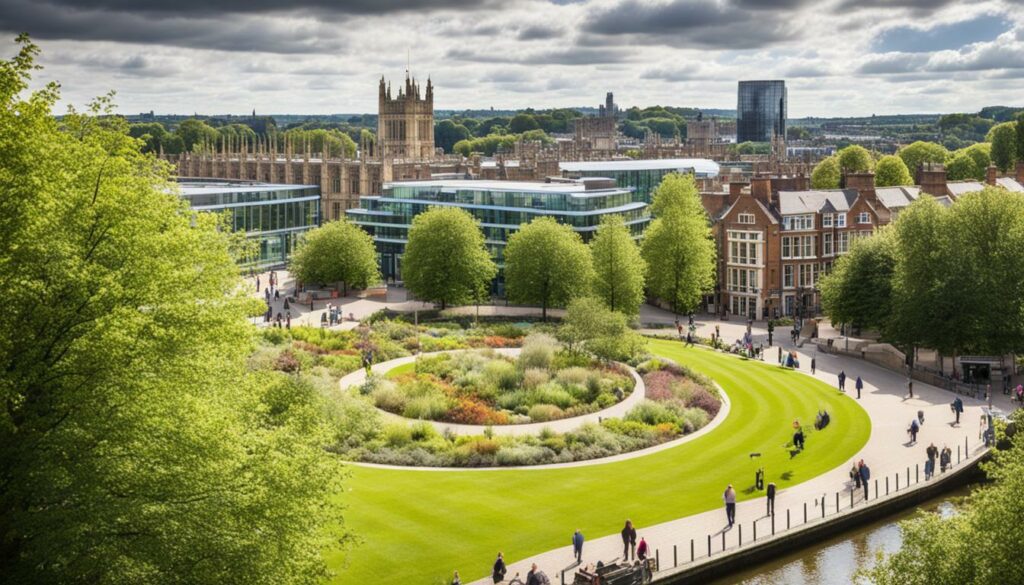Menu

Did you know the UK’s legal limits for fine particulate matter (PM2.5) are currently twice as lenient as the World Health Organization’s (WHO) guidelines? This shows the need for stricter environmental rules, which the UK Environment Act 2021 tackles. The Environment Secretary called it “the most ambitious environmental programme of any country on earth.” The Act creates a solid legal base for dealing with UK environmental issues after Brexit.
The UK Environment Act 2021 puts forth new targets for air quality, water cleanliness, nature protection, and less waste. It also leads to the setting up of the Office for Environmental Protection (OEP). The OEP makes sure everyone follows these new laws. This Act is aimed at enhancing various parts of the UK’s environment, focusing on principles like taking precaution and making the polluters pay.
The UK Environment Act 2021 is a key step to strengthen environmental rules in the post-Brexit UK. It was brought by George Eustice, Secretary of State for the Environment, Food and Rural Affairs. This law ensures that tough environmental standards, previously set by the EU, are kept.
This important law started on March 16th, 2022. It lets the UK set new, big goals for the environment, after talking with the public for eight weeks. Because a lot of people wanted to have their say, the public time to share their thoughts was extended to June 27th, 2022.
The Act includes a big rule to cut down on PM2.5 pollution. Current UK rules aren’t as strict as they should be, according to the World Health Organization. So, the Act will make the UK’s air cleaner by setting new, harder goals.
It also tells 60 councils in England to lower the amount of nitrogen dioxide in the air. The cost of air pollution in the UK is over £20 billion each year, says the Royal College of Physicians. But if the UK meets the WHO’s air quality goals, it could save £1.6 billion yearly.
The UK Environment Act 2021 has created the Office for Environmental Protection (OEP), too. This is a new group that can make sure companies follow the rules on the environment. It helps make up for the EU’s old role, which used to check on the UK.
The Act requires creating big goals for things like air quality by the Secretary of State. This shows how serious the UK is about fighting climate change. Now, in the UK, people can make special agreements to look after the land better since September 30th, 2022.
The law also makes water companies work to stop storm water from causing pollution. It makes sure new building projects help nature grow, by needing them to increase biodiversity by at least 10%.
And the Act covers dealing with electronic waste and making sure waste is handled well. It also lets UK officials set rules for waste and recycling. All these parts are important for taking care of our planet.
| Key Provisions | Details |
|---|---|
| Environmental Targets | Mandates the setting of long-term targets for air quality, biodiversity, water, and waste. |
| Public Consultation | Eight-week consultation extended to 27th June 2022 for comprehensive public input. |
| Pollution Reduction | Legally binding targets for PM2.5 and NO2 pollution, with significant economic and health benefits. |
| Office for Environmental Protection (OEP) | New watchdog with enforcement powers to ensure compliance with environmental laws. |
| Biodiversity Net Gain | Mandatory 10% net gain for new developments. |
| Water Management | Duties on water companies to mitigate storm overflow impacts. |
| Electronic Waste Tracking | Introduced to deter and manage waste crime. |
| Conservation Covenants | Voluntary agreements for long-term environmental protection. |
The UK Environment Act 2021 sets the stage for a strong environmental governance UK. It’s based on five key principles: precautionary, polluter pays, integration, prevention, and rectification at source. These rules make sure the effects on nature are at the heart of policy making. It is a must for ministers to think about these impacts carefully.
The precautionary principle is crucial in sustainability regulations. It says we should act to stop harm, even if we’re not 100% sure of the harm. This means taking careful steps to keep our planet safe.
The polluter pays principle says those causing harm must fix it. In the environmental governance UK rules, this makes sure polluters pay for the harm they do, not the whole society.
The integration principle tells us to always think green in every policy. This way, looking after our planet is a top priority, not something we add later as an option. It is a fundamental part of sustainability regulations.
The prevention principle stands for stopping harm before it starts. It focuses on avoiding bad actions for the planet. By following this, we protect our surroundings in the long run and obey the law better.
Rectification at source means fixing harm where it began. This idea encourages immediate steps to cut down the damage to our planet. It functions strongly in the environmental governance UK efforts.

The Office for Environmental Protection (OEP) is a big step forward for the UK’s eco protection. It was created under the Environment Act 2021. This new watchdog checks if the government is sticking to eco laws. It’s key for strong environmental control after the UK left the EU.
The OEP keeps an eye on how well environmental plans are going. It makes sure public groups follow the green rules. By introducing new must-do goals for clean air, water, wildlife, and less waste, the OEP plays a big part in protecting the UK’s environment.
The Environment Act 2021 gives the OEP power to keep the government in line with green choices.
The OEP is serious about listening to what the public thinks. A recent talk by Defra about long-term green targets shows this. It’s on until 27th June 2022. This shows the OEP really wants to hear from everyone on important environmental issues.
The OEP doesn’t replace the Environment Agency. But it has strong powers to deal with big breaches of eco rules. It can set must-meet targets, like cutting fine particle air pollution by 2040. This will help make the air safer, which is very important since the current UK limits are not as strict as WHO suggests.
Air pollution costs the UK over £20bn a year in health problems, says the Royal College of Physicians. But if the UK met WHO air quality goals, the economy could gain £1.6bn a year, notes the Confederation of British Industry. These numbers underline why the OEP’s strong checks are crucial.
Friends of the Earth worry the Environment Act might actually lower protection levels. Understanding how enforcement works is vital. It helps find a good balance between strong environmental management and meeting public concerns.
The UK passed the Environment Act 2021 aiming for zero waste. This law puts the onus on businesses for their products’ waste. It also bans some plastic and encourages recycling. The goal is to keep resources from being wasted.

The Act says businesses must pay for their product waste. This makes them think about the entire life of what they sell. It helps cut rubbish and moves us closer to a zero waste future.
One big step is cutting down on throwaway plastics. The government can now tax these items. This fits into the plan to stop all avoidable plastic waste by 2042. After cutting back on plastic bags, more steps are coming to reduce plastic use even more.
Reusing more is key to wasting less. The Act lets the UK set up a system to return drink containers. This makes recycling those containers more attractive to people. It helps reach the goal of using resources better and not relying too much on landfill.
The law also fights illegal dumping of electronic waste. It makes sure those handling waste follow the rules. This stops bad waste management and teaches us to manage resources carefully.
| Objective | Regulation |
|---|---|
| Producer Responsibility | Resource Efficiency Requirements |
| Single-Use Plastics | Charges for Single-Use Items |
| Deposit Return Schemes | Deposit Return Regulations |
| Electronic Waste Tracking | Electronic Waste Tracking Regulations |
The UK Environment Act 2021 has set a big plan to make the air cleaner. It’s about cutting down the amount of fine dust in the air, called PM2.5. The goal is to have only 10 micrograms of PM2.5 in each cubic metre of air by 2040, which is much cleaner. The Act also wants to reduce how much dirty air people breathe by 35% from 2018 levels.
The Act is a big step forward, but the actual goals were set a bit late. Despite this, the UK is very serious about making its air cleaner everywhere. Right now, the country already meets most clean air rules set by the government. But there’s still a problem with cars and factories making too much nitrogen oxides.
The UK has made a law to cut down on dirty air off houses and factories. But with COVID-19, more of a type of fine dust, PM2.5, is in the air. This came from using things at home and from factories more after lockdowns.
A lot of the bad air in the southeast of England comes from other countries. The UK is working on new goals to fight this. These goals are being discussed till June 2022. If the UK can make its air as clean as WHO says it should be by 2030, it will save a lot of money. It could save £20 billion a year and make £1.6 billion more in the economy.
Here are the big sources of bad air in the UK:
| Source | Percentage of PM2.5 Emissions (2021) |
|---|---|
| Domestic Combustion | 27% |
| Industrial Combustion of Biomass Fuels | 18% |
The UK is now committed to hitting the 2040 target by reducing bad air. New rules for checking the air, like BS EN12341:2014 and BS EN16450:2017, will help. By using the best tools for measuring the air, we can all breathe cleaner air.
The UK Environment Act 2021 has made big changes in environmental water management. It sets new high standards to improve water quality UK. Part 5 focuses on storm overflow and sewage. It tells water companies to take steps that lessen environmental harm from their work.

Water companies have to lower their environmental impact following new rules. They need to meet specific targets. They must give reports and data on stormwater to the Environment Agency. This makes them more open about their actions.
They also need to watch water quality near sewage plants. This helps protect water quality UK.
The Act also created the Office for Environmental Protection (OEP). This agency checks that the government and the public meet the Act’s goals. The OEP makes sure rules on air, water, wildlife, and waste are followed.
Now, utility providers must make and keep updating Drainage and Sewerage Management Plans (DSMPs). These plans are key for managing water needs as cities grow. They also help withstanding climate changes and making infrastructure stronger. This shows a big change in how we manage environmental water.
From January 1, 2028, the Environment Agency can cancel water use permissions without pay. This helps make the law on water use tougher to protect the environment. The UK is also talking about updating more laws for better water management.
The Act makes water quality UK better and follows top environmental practices. By expecting high standards of truth and following rules, the Act celebrates the UK’s commitment to being green after leaving the EU.
Biodiversity and nature conservation are big topics under the UK Environment Act 2021. This law is all about making sure nature in the UK is safe and growing. It especially cares for the homes of plants and animals.
A key rule is the need for a 10% boost in biodiversity for every new project. This means any new work must make nature better off. By January 1, 2024, England’s public groups must show they’re helping nature. They should also check on this help every five years.
Across England, about 50 plans will be made to help nature bounce back. This starts in April 2023. These local strategies will link up to create a strong nationwide plan for nature. They aim to avoid any list of areas left out and make sure everyone acts together for nature.
This law also says talking about cutting trees is important. Cutting down trees must be careful and green. It also tells landowners to plan out how they’ll look after special nature spots. This will help them keep up the good work for nature.
| Conservation Goal | Target Year | Details |
|---|---|---|
| Protect 30% of UK Land | 2030 | Aim to halt the decline in species abundance. |
| Increase Species Abundance by 10% | 2042 | Restore or create at least 500,000 hectares of wildlife-rich habitats. |
| Annual Reviews of Actions | Every Year | Public authorities to review and update biodiversity actions. |
By weaving nature plans into current activities and talking a lot about saving nature, we can do more for wildlife. This law is set on turning around losses in nature we see across the nation.
The Environment Act 2021 (EA 2021) has brought in a new way to make sure our land is looked after in the UK. This method, called conservation covenants, lets landowners and certain groups agree to take care of the land together. They agree to keep up and make better the areas meant for conservation.

Starting from 30 September 2022, these conservation covenants are a key part of a 25-year plan to make the environment better. They get current and future landowners to work towards special goals for looking after nature, historic places, and culture. These deals are very important in keeping our natural areas safe.
These covenants are also good for builders. If a land has a conservation covenant, it might attract developers looking for places to help the environment. Such lands can help meet the needs for more nature in building projects, as regulations ask for.
Landowners can benefit a lot from these agreements too. They can keep their land but offer the promise of looking after the environment to others. Businesses interested in making eco-friendly spaces or reducing their carbon footprint will find this very appealing.
There are 117 of these conservation covenant deals under the EA 2021. They cover a wide range of conservation goals and last for at least 30 years. This gives developers a steady promise of land that will be protected for a long time.
Those in charge of making sure these covenants are followed are set to really care about the environment. This means the agreements are bound to make a real difference. They apply not just now but for a long time, ensuring the land stays safe and healthy for years to come.
The UK Environment Act 2021 has put new rules into place that businesses need to follow. These rules aim to make businesses more responsible for their environmental impact. They focus on making sure things like their products, and where they come from, are made in a way that’s fair and doesn’t harm the environment.
Now, businesses in the UK must check their supply chains for illegal activities that hurt nature. They have to look closely at their risks and be clear about what they find to lessen their environmental harm. These efforts will help companies make sure they are doing their part to be environmentally friendly.
The UK Environment Act 2021 also changes how companies deal with certain materials, like palm oil and cattle. These materials can often be a result of illegal deforestation. Now, companies have to be very careful. They must make sure they are sourcing these materials in a way that protects the environment. This is important for environmental sustainability.
| Regulation | Impact on Businesses | Compliance Requirements |
|---|---|---|
| Due Diligence Obligations | Strict monitoring of supply chains to prevent illegal deforestation | Risk assessments, transparency, accurate reporting |
| Regulation of Commodities | Adapting to stringent guidelines for high-risk ingredients | Ensure ethical sourcing, mitigate environmental impact |
The UK Environment Act 2021 highlights the need for strong environmental goals. It focuses on air quality, biodiversity, and water quality. These goals show the UK’s fight against climate change and its aim to have top-notch environmental standards.
Improving air quality is at the top of the UK’s to-do list. The aim is to cut PM2.5 levels to 10 micrograms per cubic metre by 2040. But, experts think this can be done by 2030. It would bring big economic and health wins. Clean air could boost the economy by £1.6 billion every year. It might also save over £20 billion in healthcare from pollution diseases.

UK’s biodiversity plans are also very ambitious. They hope to stop species decline by 2030. Then, they want to see at least a 10% growth by 2042. They also plan to have 16.5% of England covered by trees and forests by 2050. This is all key for nature recovery and reaching net-zero targets.
Focusing on clean water, the UK wants to cut down pollutants. By 2042, 70% of Marine Protected Areas must be in good shape. The rest should be getting better. They also target an 80% drop in phosphorus pollution by 2038. This will help keep rivers safe and support the UK’s green plans.
| Target Area | Goal | Deadline |
|---|---|---|
| Air Quality (PM2.5) | Reduce to 10 µg/m³ | 2040 (Proposed: 2030) |
| Biodiversity | Halt decline, 10% increase | 2030 (2042 for increase) |
| Tree and Woodland Cover | 16.5% of total land area | 2050 |
| Marine Protection | 70% features favourable condition | 2042 |
| Phosphorus Pollution | 80% reduction | 2038 |
In 2021, the UK introduced the Environment Act. It updated the country’s environmental policies by setting new rules. These rules aim to improve air quality, water standards, and protect wildlife. A big part of the Act is the Office for Environmental Protection (OEP). The OEP makes sure people follow the new laws after the UK left the EU.
The UK’s Department for Environment, Food & Rural Affairs (Defra) asked for public opinions in an eight-week consultation. It focused on the country’s environmental goals for the future, such as cleaner air and less waste. But, many people were upset because they didn’t get enough details, like reports and how new plans might affect them.
Many felt the short eight-week time was too brief to understand and feedback properly. So, the consultation got extended to give more time for people to respond. Still, many people found parts of the plans unclear. For example, while 24% thought the introduction was clear, 45% disagreed. Half of those taking part believed the first policy step didn’t capture the full environmental impact.
People also worried if the OEP could really act independently from the government. Some groups wanted the OEP to make the air cleaner according to WHO’s health standards by 2030. This shows how much the public wants a say in the environmental policies of the UK.
The consultation ended with 216 responses, mostly from environmental organisations and big industry players. These voices stressed the need for clearer plans and more practical steps. It’s shown that open conversations and including everyone are key in making the UK’s environment better.
The UK Environment Act 2021 received a grand welcome for being a big step in environmental protection. It drew a lot of praise. But, the Act faced a lot of criticism too. Many experts think it falls short of the high environmental goals it set. They say the Act is not as strong as it should be in keeping the environment safe.

The Act created the Office for Environmental Protection (OEP) to check if the government is keeping to the green laws. However, many people feel the OEP doesn’t have enough power to make real changes. It can warn or even punish the government for not following the rules. But, it can’t do things as strong as the European Commission once could.
Also, making and changing the green laws through ‘secondary legislation’ has raised eyebrows. Some worry that this method means there’s not enough oversight by members of parliament.
The Act also got into hot water over its short-term goals. Critics say these goals are too vague. This might slow down the Act’s power to bring fast changes for the environment. What’s worse, people feel they don’t get to say enough about these goals. They think there should be more open talks about the laws that protect our planet.
Then, there’s the issue of who gets to change the green rules in the long run. The Act lets government ministers decide big future goals for the environment. They also keep an eye on how these goals are coming along. And, they can change the environmental rules too. Some worry that ministers might tweak these rules to look good politically, rather than truly do what’s best for the planet.
Post-Brexit, the UK faced big changes in its green rules. The 2021 Environment Act shows a big move away from old EU rules. Yet, the UK’s new course can still be compared to the EU’s past green policies.
Since Brexit, the UK has made its own laws on the environment. The Environment Act introduced new goals for air quality. It aims to lower fine dust (PM2.5) to 10 micrograms per cubic meter by 2040. Some say this isn’t as fast as the EU’s and WHO’s recommendations.
Brexit hasn’t cut off the EU’s green influence. Cooperation on chemicals, waste, and air quality is still needed. The UK’s new watchdog, the Office for Environmental Protection, is like the EU’s old system. And thanks to the Trade and Cooperation Agreement, the UK must keep up with the EU’s environmental standards.
The EU and the UK both want to be greener. But they’re not doing it the same way. The EU now restricts sending plastic waste to poor countries. The UK, however, still allows this if the receiving country agrees. Also, the EU is tougher on gene editing and GMOs than the UK is now.
The table below shows the main changes in green rules between the EU and the UK:
| Aspect | EU Policies | UK Policies |
|---|---|---|
| Air Quality Standards | Follow WHO rules | Setting weaker PM2.5 goals for 2040 |
| Plastic Waste Export | Mostly banned, only clean plastics allowed | OK for unsorted plastics with agreement |
| GMO Regulation | Strict rules under EU law | Rules are less strict now |
The future of UK green policies is still being written. It’s not clear yet how different they will be from the EU’s.
The UK Environment Act 2021 marks a strong start for updating our environmental laws. This law focuses on creating tougher targets to protect our environment better. It also gives the Government the freedom to change these targets as our problems change.

The new Office for Environmental Protection (OEP) is making sure public bodies do their part. A public consultation starting in March 2022 shows how keen we are on fair and flexible policymaking.
One big goal is to lower PM2.5 pollution to 10 micrograms by 2040. Some think we can hit this goal by 2030, like experts from King’s College London. Acting faster would better protect our health.
The Act looks at improving air and tackling waste issues. For example, there’s a tax on plastic packaging to push companies to be kinder to our planet. Scotland banned certain single-use plastics, leading the way for more changes.
In addition to these, the Act has set a rule that new projects must add to our biodiversity by 2023. There’s a huge amount of money ready to support these moves. It shows we can protect our environment and grow our economy together.
This new Act has a clear aim. It wants to make our air cleaner, protect our health, and boost our economy. It shows that doing good for the planet can be good for us too.
The Act can change quickly to address new environmental challenges. This makes our future efforts to protect the environment look promising. We’re on a path that aims for success in keeping our world green and healthy.
The UK Environment Act 2021 has brought in a new way of handling environmental issues. It is a big step, especially for England. After more than 1,000 days, this Act is finally here to improve environmental rules after Brexit.
This Act is key for businesses in England and those wanting to sell in Great Britain. Great Britain includes England, Scotland, and Wales. They need to follow new environmental standards set by this law.
The Act has some exciting parts. It sets a strong plan for making and changing environmental laws. Ministers can now set big goals and tell Parliament about the progress. This ensures they keep an eye on things.
It also makes sure important rules are always thought about in making policies. The Act says to always consider the precautionary principle and the polluter pays principle. This makes sure the environment is a top priority in decisions.
The Act has created the Office for Environmental Protection (OEP). It’s a big change, taking over the EU’s role in watching and making sure laws are followed. This new office will check things like water and air quality, waste, and chemicals rules.
The rules don’t just affect the UK. They also have an impact on foreign companies that sell products in Great Britain. This is especially true in how chemicals are regulated under UK REACH.
Although the Act aims to do a lot for the environment, we will have to see if it works in the future. Achieving these goals and maybe changing things later will show if the Act is a real success. It could make the UK a top player in looking after the environment around the world. For a detailed look, you can check out this article.
The UK Environment Act 2021 sets out new laws post-Brexit for environmental care. It’s big on improving air and water quality, waste management, and saving wildlife. Plus, it creates a new group, the Office for Environmental Protection (OEP).
The Act turns five big environmental rules into UK law. These include looking ahead, making polluters pay, and fixing problems early. They make sure decisions keep our planet safe and make wrongdoers cover the costs.
The OEP keeps an eye on how well the government follows green laws. It can take action if laws aren’t followed, making sure our environment stays protected without the EU helping anymore.
The Act handles waste better by making companies take more responsibility. They must manage single-use plastics well and help set up better recycling. This makes sure wastes are tracked to catch illegal dumping.
The Act tells the government to make rules that cut down on dirty air. Although the exact goals and deadlines aren’t set, it shows the plan to make the air cleaner is in place.
A part of the Act is all about making water cleaner. It aims to stop water companies from harming the environment too much. These companies also need to check in with Parliament regularly on their progress.
Any new building work must make 10% more room for wildlife than before. This way, we keep making our country greener and friendlier for plants and animals.
Conservation covenants are promises between people who own land and those who care for it. They swear to keep the land safe for nature, even for whoever owns it next.
Businesses must check that their products don’t harm forests illegally. This pushes them to buy and sell things in ways that are good for the planet. It changes how business works in many areas.
The Act says we must aim high for a clean and green future. It tells the government to set big goals to beat climate change and protect nature more every year.
Talking to the public is key in planning our green future. The Act makes sure everyone can join in and keep an eye on what the government is doing for nature.
Some say the Act needs to do more to be the best. They’re worried about how well the new rules will be enforced and if we’re really making things better. Others think it’s not as strict as the rules in the EU used to be.
The Act wants to keep our environment just as safe as Europe’s rules did before. But some think Europe had it better. How well this all works out will have to be seen as we go on.
The Act is just the start. As we learn more about taking care of our world, the Act can change and grow to do better. It’s our guide to keep making our country cleaner and safer.